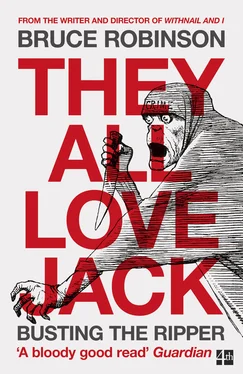The Honourable and Learned Gentleman in question was Sir Charles Russell, who immediately professed complete ignorance of the matter. ‘I know nothing about them,’ he said.
This was too ridiculous a falsehood for even Sir Richard Webster to swallow, and although Russell was on the same bent agenda, he replied, ‘The Honourable and Learned Gentleman’s memory misleads him,’ which is another way of saying, ‘You are lying like the label on a bottle of snake-oil.’
Indeed he was. Russell had appeared for a man called Newton (this on behalf of the Prince of Wales). On the application to move the case to the Queen’s Bench, Newton’s affidavit stated ‘that he had been a party to getting Hammond to go away on account of the blackmail he was levying on people in England’.
Who might these ‘people in England’ be? And rather than the police sending Partridge (and the mysterious Tyrell) to America with wads of cash, why wasn’t Hammond extradited from Belgium and prosecuted for the very serious crime of blackmail? It was a question for which the Establishment didn’t require an answer; and anyway, it was all over bar the shouting, the business of the House complete except for the ritual expulsion of Labouchère.
He was finally ordered out of the pantomime by means of a parliamentary device enforced from time to time against Members who persisted in telling the truth.
LABOUCHÈRE: I am obliged to speak frankly and truly in this matter. I assert, if I am obliged to do it, that I do not believe Lord Salisbury.
THE SPEAKER: I must call on the Honourable Member to withdraw the expression.
LABOUCHÈRE: I decline, sir, to withdraw.
And as a matter of fact he repeated it. The First Lord of the Treasury, the successful newsagent W.H. Smith, got to his feet.
‘It is my duty to move that Mr Henry Labouchère be suspended from the service of this House.’
MPs call themselves ‘Honourable’ because nobody else would. The House divided. There was a vote. Ayes 177, Nos ninety-six. The Ayes had it, and out Labouchère went.82
The End.
The Scandal of Cleveland Street affords an opportunity to take a look at the Victorian ruling class on the run. With survival in mind, extremes of criminal behaviour were no problem. It was ruthless as Herod. After a breather of two or three weeks, on 3 March 1890 Salisbury got up in the Lords and fibbed like a slut, and that was just about that. As his recent biographer Andrew Roberts tells us, ‘He shrugged it off.’
The thrust of Salisbury’s speech was immediately to raise the matter over which his conduct ‘had been called into question’: ‘My Lords, it is said that I met with Sir Dighton Probyn, with the view of enabling a person who was exposed to a serious charge to escape from justice.’ He then went on to describe how he had done precisely that, while insisting that he hadn’t. He’d just come back from France, he said, where at Dover, he found a telegram from Probyn, asking if he could meet Salisbury in London.
I had no notion what it was about … I replied that I should be passing through town, and that he would find me at the Great Northern Railway Station in time for the 7 o’clock train … Sir Dighton Probyn came to see me there. He then informed me what he wanted to do was to ask whether there was any ground for certain charges which had been made in the newspapers against sundry persons whom he named. My reply was, that so far as I knew, there was no ground whatever for them … I think I added – but of that I am not quite certain – that rumours had reached me that further evidence had been obtained, but I did not know what its character was. My Lords, I am not ashamed to say that is all I recollect of a casual interview for which I was in no degree prepared, to which I did not attach the slightest importance … and I may add that I can aver in the most confident manner that the suggestion which has been made that a man of Sir Dighton Probyn’s character and career could have appointed an interview with me for the purpose of worming out matter which he might use for the purpose of defeating the ends of justice is the wildest and most malignant imagination that has ever been conceived.83
Note how this most expert liar transfers the accusation onto Sir Dighton Probyn. Is this not the most astonishing casuistry? Salisbury had deflected criticism of his own propriety into a question of the honour of Sir Dighton Probyn.
Except, that same night, Probyn had tipped ‘Podge’ Somerset off, and he had quit London with the alacrity of a rat up a drainpipe. The next day, Probyn had written to the Prime Minister, ‘I fear what you told me last night was all too true,’ a mystery of circumstance confirmed by a letter to Probyn from the Prince of Wales: ‘Your interview with Somerset must have been a very painful one.’
In reality, Sir Dighton Probyn and the Prince’s Private Secretary, Sir Francis Knollys, had been rushing around like a pair of hysterical waiters for months, battling for the homosexual corner in the wildest and most malignant way to defeat the ends of justice.
Salisbury’s fiefdom was intoxicated with corruption, poisoned with its own iniquity. A year before, the Liberal leader Gladstone had put his knuckles on his hips and surveyed the Conservative benches opposite. His contention was ‘that no government during the past half century had shown so unblushing and unscrupulous a contempt for the law as had that of Lord Salisbury’.
He was alluding here to another great and concurrent scandal, the conspiracy to defame and destroy Charles Parnell. The Parnell scandal featured government perjury, forgery, slander, bent courts and imprisonment of the innocent, establishing new benchmarks of political deceit by what Gladstone called ‘the foulest and wickedest means’.
The Cleveland Street and Jack the Ripper scandals were from the same stable, and were managed with no less élan , requiring little more from the ruling elite than instinct. If the Crown was under threat – be it from a nancy prince or a Monster with a Blade – it was a threat to them all. And they all knew – every baron, every earl, every duke – that, provided the monarch remained supreme, then so did its most ardent beneficiaries, this to include Queen’s Councillors, Most Honourable Judges, senior policemen and arse-licking MPs. They were the Royal Courts of Justice, not the people’s courts, and I do not exaggerate when I say they were almost exclusively staffed by Freemasons.
In respect of Cleveland Street, the victims , low-class working boys, went to prison, and the perpetrators, guilty as it got, walked free. Bro Euston, Bro Clarence and his dad, Bro the King-to-be, were all Freemasons, and that was not without significance. To join the Masons in the nineteenth century wasn’t like signing up at the golf club, because Victorian golf clubs didn’t exercise the power of the state. Golf clubs couldn’t hang people, or incarcerate them for life. In the matter of Clarence, we are talking about the ability of Freemasonry to seriously interfere with the administration of the law. The most senior Law Lord in England, the Lord Chancellor Lord Halsbury, was a Freemason. The man who framed charges on behalf of the government, the Solicitor General Sir Edward Clarke QC MP, was also a Freemason. In his memoir, Bro Clarke tells us: ‘I kept up my Masonic work until I became a Member for Plymouth. Then I practically abandoned it for twenty years.’84
And why was that?
‘Because I wished to avoid the slightest possibility of it being connected with politics.’
In which case, he must have had less sentient aptitude than the three famous monkeys. By the late nineteenth century Freemasonry and politics were inextricable, the Houses of Parliament resembling an enormous and permanent Freemasonic lodge. To vote Conservative in the late 1880s was to vote for the Conservative (Freemasonic) and Unionist Party. Without effort, I was able to identify 338 Freemasons in the Parliament of 1889. You could safely add another fifty.
Читать дальше











